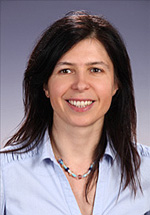Laboratory of Protein Dynamics
Department of Biochemistry and Molecular Biology
Faculty of Medicine
University of Debrecen
Life Science Building
Egyetem tér 1.
Debrecen, Hungary, H-4010
Phone: +36-52-416-432 (office)
Direct dial:
+36-52-512-900 ext. 65938 or ext. 62066
Fax: +36-52-314-989
| Group leader: |
Monika Fuxreiter, Ph.D., D.Sc. |
| Associate professor Department of Biochemistry and Molecular Biology Faculty of Medicine University of Debrecen |
|
| Contact: | This email address is being protected from spambots. You need JavaScript enabled to view it. |
| Phone: | This email address is being protected from spambots. You need JavaScript enabled to view it. |
| Homepage of Laboratory of protein dynamics: |
http://protdyn.med.unideb.hu/ |
|
Group members |
Marton Miskei, Senior scientist Rashmi Sharma, Graduate student Norbert Duro, M.Sc student Viktor Ambrus, M.Sc student Zsolt Raduly, DETEP student |
Current Research
We are interested in the role of dynamics in shaping biological activites of proteins, focusing on two areas: i) fuzzy complexes ii) rational enzyme design.
Fuzzy complexes are molecular assemblies of intrinsically disordered proteins, where structural ambiguity/multiplicity is maintained in the bound form and is required for function. Fuzzy regions remain highly dynamic or adopt multiple conformations in the complex, but via transient interactions modulate the conformational equilibrium, tune the flexibility of the interface, facilitate further interactions or compete with the partner. Depending on the cellular context or physiological conditions, fuzzy regions can adopt different conformations. This results in context-dependence of proteins, which are equipped with fuzzy segments. Tissue specificity of different protein isoforms for example, was related to alternative inclusion of protein interaction motifs, which are embedded in fuzzy regions. We aim to understand structural, mechanistic and regulatory features of fuzzy complexes and elucidate the molecular background of context-dependence. Our goal is to establish quantitative relationships between the dynamic properties of protein regions and their biological function by employing computational and biochemical approaches.
Rational enzyme design. Designing proteins to catalyze unnatural reactions is not only the ultimate test of our understanding how enzymes work, but also a very useful approach for biomedicine and biotechnology. This endeavor is a computer-assisted process, followed by the production and laboratory optimization of the high-level theoretical models. Albeit enzymes with desired activities can be 'created', their efficiencies are much behind their natural counterparts. Based on the seminal work of Arieh Warshel (2013 Nobel prize in Chemistry) the optimization of the reorganization energy is the major driving force of catalysis, which however is not taken into account during model selection for artificial enzymes. We studied enzyme libraries, which were generated by directed evolution and concluded that reorganization energy is optimized during optimization of enzymatic activity. We exploit this principle in enzyme design and develop screening methods using the concept.
Research infrastructure
Multimode plate reader H1MF
Biorad PCR T100 thermocycler
Representative publications
Fuzzy complexes: polymorphism and structural disorder in protein–protein interactions.
P. Tompa and M Fuxreiter
Trends in Biochem. Sci 33, 2-8 (2008)
Malleable machines take shape in eukaryotic transcription regulation.
M Fuxreiter, P Tompa, I Simon, VN Uversky, JC Hansen, F Asturias
Nat Chem Biol 4, 728-737 (2008)
Local structural disorder imparts plasticity on linear motifs.
M. Fuxreiter, P. Tompa, I. Simon
Bioinformatics 23, 950-956 (2007)
Disordered tails of homeodomains facilitate DNA recognition by providing a trade-off between folding and specific binding.
A Toth-Petroczy, I Simon M Fuxreiter, Y Levy
J Am Chem Soc 131, 15084-85 (2009)
On the origin of the catalytic power of acetylcholinesterase. Computer simulation studies.
M. Fuxreiter and A Warshel
J. Am. Chem. Soc. 120, 183-194. (1998)
Recent publications
Intrinsically disordered segments affect protein half-life in the cell and during evolution.
van der Lee R, Lang B, Kruse K, Gsponer J, Sánchez de Groot N., Huynen MA, Matouschek A, Fuxreiter M and Babu MM
Cell Reports 8, 1-12 (2014)
Disordered proteinaceous machines
Fuxreiter M, Tóth-Petróczy A, Kraut DA, Matouschek AT, Lim RY, Xue B, Kurgan L, Uversky VN.
Chem Rev. 114, 6806-6843 (2014)
The role of reorganization energy in rational enzyme design.
Fuxreiter M, Mones L
Curr Opin Chem Biol. 21, 34-41 (2014)
Tissue-specific splicing of disordered segments that embed binding motifs rewires protein interaction networks.
M. Buljan, G. Chalancon, S. Eustermann, G. Wagner, M. Fuxreiter, A. Bateman, M.M. Babu
Mol Cell 46, 871-883 (2012)
Fuzziness: linking regulation to protein dynamics.
M Fuxreiter
Mol Biosystems 8, 168-177. (2012)
Dynamic protein-DNA recognition: beyond what can be seen
M.Fuxreiter, I. Simon, S. Bondos
Trends in Biochem Sci 36, 415-423 (2011)


